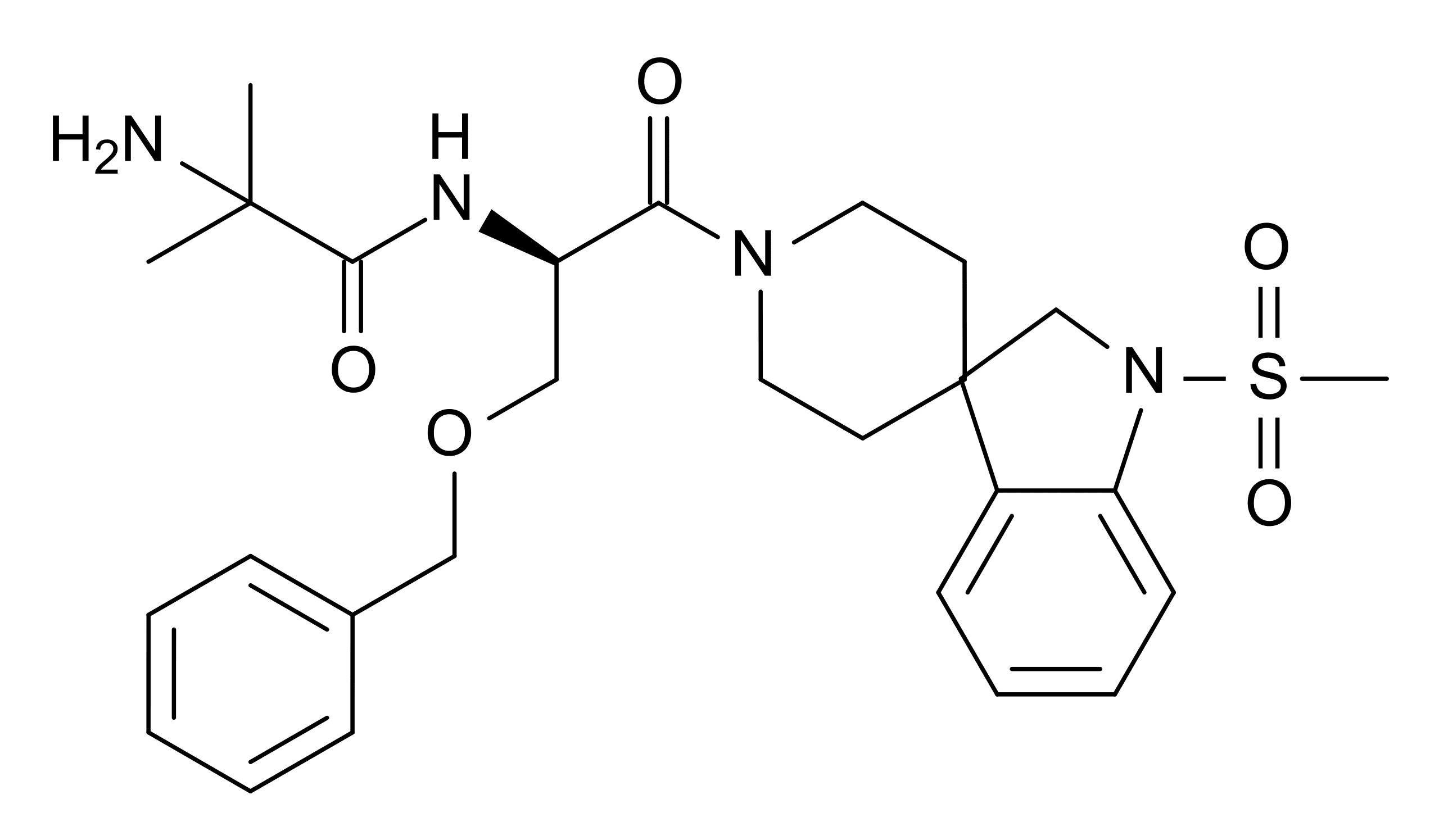MK-677 is a non-peptide ghrelin agonist and growth hormone secretagogue that has been shown to improve body composition, sleep quality, bone density, and more.

MK-677 refers to ibutamoren mesylate, an orally active, non-peptide growth hormone secretagogue. As a selective agonist of the ghrelin receptor, MK-677 stimulates the pituitary gland to produce and release growth hormone (GH) and insulin-like growth factor 1 (IGF-1) without affecting levels of cortisol to a significant extent [1].
MK-677 has been nominated as a treatment of growth hormone deficiency (GHD, including adult-onset GHD) and catabolic conditions, and has been extensively studied in a variety of contexts, including for its roles in promoting bone formation and resorption, aiding in fat loss, and improving sleep quality [2].
At the time of writing, there are no FDA-approved products containing ibutamoren mesylate, and MK-677 is classed as an Investigational New Drug in the United States, available to researchers as a reference material [2].

MK-677 is mechanistically indistinguishable from growth hormone-releasing peptide-6 (GHRP-6) and works by mimicking ghrelin, thus binding to the growth hormone secretion receptors (GHS-R) and stimulating the release of GH [3].
Preclinical animal studies have shown that MK-677 does not affect normal negative feedback mechanisms in the GH pathway such as somatostatin. MK-677 has been shown to trigger GH secretion without having a significant effect on plasma levels of aldosterone, luteinizing hormone, thyroxine, and prolactin, and only a modest effect on cortisol [1].
MK-677 is orally available, has an elimination half-life of 4-6 hours [1], and can be administered once daily [3], making it a strong candidate to treat GH deficiency as an alternative to exogenous GH therapy [4, 5].
Researchers at the University of Maryland have identified 16 experimental MK-677 studies and one observational study published between 1996 and 2018. These 17 studies involved a total of 1,664 test subjects, with the number of participants in each study varying between 8 and 564 [2]. Here is a summary of the main benefits of MK-677 observed:
Improves body composition: Several short-term clinical studies have found that MK-677 can positively impact body composition in test subjects. Notably:
A two-month study by Svensson et al. (1998) found that MK-677 helped increase GH levels and preserve levels of fat-free mass (FFM) when administered to twenty-four obese males while dieting. During the study, test subjects were assigned to receive either MK-677 25 mg or a placebo daily for 8 weeks.
Those who received MK-677 experienced a 40 percent increase in serum insulin-like growth factor I (IGF-I) and a significant increase in serum IGF-binding protein-3, especially during the second and eighth weeks. According to the researchers, MK-677 treatment resulted in sustained increases in lean body mass and a temporary increase in basal metabolic rate, levels suggesting that further study was needed to see if a higher dose of MK-677 or a longer treatment period would affect levels of body fat [7].
Enhances quality and duration of sleep: In 1997, Copinschi et al. found that MK-677 improved the quality and duration of sleep when administered to eight young test subjects. The study involved eight young test subjects aged 18-30 years participating in three treatment periods lasting seven days each.
The test subjects were randomly assigned to receive a bedtime dose of either MK-677 (5 and 25 mg) or placebo. Those who received MK-677 experienced a “50% increase in the duration of stage IV sleep and a more than 20% increase in REM sleep” compared to placebo. Researchers concluded that MK-677 may “simultaneously improve sleep quality and correct the relative hyposomatotropism of senescence” [8].
Aids bone formation and resorption: Other studies have investigated the effects of MK-677 on bone formation and resorption:
A 1999 paper published by Murphy et al. as “MK-677 Study Group” reported the findings from three separate studies into the effects of MK-677 on bone turnover in healthy and functionally impaired elderly adults.
The first study involved 32 healthy seniors who were assigned to receive either MK-677 at 10 mg or 25 mg, or placebo.
The second study involved 50 healthy adults aged 65-85 who received either MK-677 at 25 or 50 mg/day or placebo, while the third study involved 105 elderly patients with functional impairment aged 65-94 who received MK-677 (5, 10, or 25 mg) or placebo. According to the authors, “once-daily dosing of MK-677 stimulates bone turnover in elderly adults” [9].
A randomized, double-blind, parallel, and placebo-controlled trial by Svensson et al. (1999) assigned 24 obese patients to receive either MK-677 25 mg or placebo. Researchers found that short-term MK-677 treatment led to increases in markers of bone resorption and formation but suggested that further long-term studies were needed to gauge MK-677’s effect on bone mass [10].
Experimental treatment of Alzheimer’s Disease: A 2008 study by Sevigny et al. examined whether MK-677 could slow the rate of progression of symptoms in patients with Alzheimer’s Disease (AD). The researchers were operating on the belief that MK-677’s ability to raise IGF-1 levels would clear amyloid beta plaques from the nervous systems of AD subjects, thus slowing the disease’s progression.
The study involved a total of 563 patients with mild to moderate AD who were randomly assigned to receive MK-677 25 mg or placebo daily for 12 months. 416 patients completed the study, and those in the MK-677 group experienced a 60 percent increase in serum IGF-1 levels at six months and a 72.9 percent increase after one year. Unfortunately, scores from the diagnostic tests used to assess the volunteers found that MK-677 was “ineffective at slowing the rate of progression of AD” [11].
The results of a study into the effects of MK-677 on healthy, older adults showed that it causes the following side effects [13]:
This is consistent with the results of other MK-677 human clinical trials to date, which have not linked the compound to any severe side effects.
Little is known about the long-term safety of MK-677 as the drug has yet to pass a phase 2 trial and further research is needed to confirm its safety.
The most recent phase 2 trial involving MK-677 aimed to investigate the safety and efficacy of MK-677 for treating somatropin deficiency in children. However, this trial was suspended in July of 2021, before reaching a conclusion [4].
Notably, one 24-week study involving 123 elderly hip fracture patients was discontinued due to MK-677’s potential to increase the rate of congestive heart failure (CHF) in a few of the patients, with researchers concluding that the compound had an unfavorable safety profile in that specific population [14].
These findings indicate that a long-term safety study with independent validation is required before drawing any conclusions about the safety of MK-677.
Because MK-677 is an experimental compound with no officially recommended dosage, researchers may consult the above-cited literature to see how it has been administered in past studies.
Researchers typically start with an MK-677 dose of 12.5-25 mg/day across a variety of objectives.
Since it takes some time to achieve GH increase in the subject, the compound should be administered for an extended duration. Commonly, the material is given in cycles of 16-20 weeks, followed by a break of about one month.
Qualified researchers may purchase MK-677 as a reference material from a number of online vendors. In our team’s experience, very few suppliers actually supply research-grade MK-677 or reliably deliver it worldwide.
Fortunately, we have found two vendors that do supply high-quality MK-677.
Chemyo is one of our top recommended vendors of MK-677, and here’s why:
Research Peptide is another extremely competent research chemicals vendor, and one that we trust based on their quality analysis, express shipping, and wonderful customer care team.
Below is why they are so trusted:
In research settings, MK-677 is typically administered orally, once daily.
MK-677 is widely available in liquid or capsule form, to be swallowed by the subject.
MK-677 does not need to be reconstituted.
Researchers may legally purchase MK-677 as a research chemical for in vitro experimentation.
Based on the results of human clinical trials to date, MK-677 has been shown to have a favorable safety profile in healthy research subjects. Unlike the vast majority of research peptides on the market, MK-677 is available in capsule form, which vastly reduces the risk of administering an incorrect dose.
Based on the research to date, MK-677 has been found to improve body composition, bone health, neurologic function, and sleep quality.
No, MK-677 is a non-peptide ghrelin agonist and growth hormone secretagogue, not an anabolic-androgenic steroid.
No, MK-677 does not increase testosterone and it does not affect the natural production of the hormone.
Studies have shown that MK-677 can increase fat-free mass during research, namely in healthy older adults and children with growth hormone deficiency.
Studies have shown that MK-677 can cause body weight increases in healthy older adults and children with growth hormone deficiency. A known side effect of MK-677 is increased appetite, which can lead to weight gain in research subjects.
We’ve compiled a number of resourceful articles for you to learn more about MK-677 and its potential benefits and side effects including:
MK-677 is an actively researched growth hormone secretagogue that has been shown to increase GH and IGF-I levels. There is evidence that it stimulates the production of fat-free mass, improves sleep and bone turnover, and reduces diet-induced nitrogen wasting—among exhibiting other benefits.
Given its generally favorable safety profile to date and ease of administration, MK-677 is a strong candidate for research in the areas of fat reduction, bone health, sleep, neurologic function, and longevity.
Researchers interested in studying MK-677 are advised to visit our preferred vendor.

Disclaimer: Peptideinfo.net contains information about products that are intended for laboratory and research use only, unless otherwise explicitly stated. This information, including any referenced scientific or clinical research, is made available for educational purposes only. Peptideinfo.net makes every effort to ensure that any information it shares complies with national and international standards for clinical trial information and is committed to the timely disclosure of the design and results of all interventional clinical studies for innovative treatments publicly available or that may be made available. However, research is not considered conclusive. Peptideinfo.net makes no claims that any products referenced can cure, treat or prevent any conditions, including any conditions referenced on its website or in print materials.
To the extent that Peptideinfo.net references a product that is also a prescription medication, Peptideinfo.net does not does not offer medical diagnosis or treatment advice. The contents of Peptideinfo.net are intended exclusively for qualified researchers. Any individual seeking any advice on any prescription medication, or any disease or condition, is advised to refrain from using this site and consult their healthcare provider. Statements regarding products presented on Peptideinfo.net are the opinions of the individuals making them and are not necessarily the same as those of Peptideinfo.net.
Your access to Peptideinfo.net is subject to our terms of use.